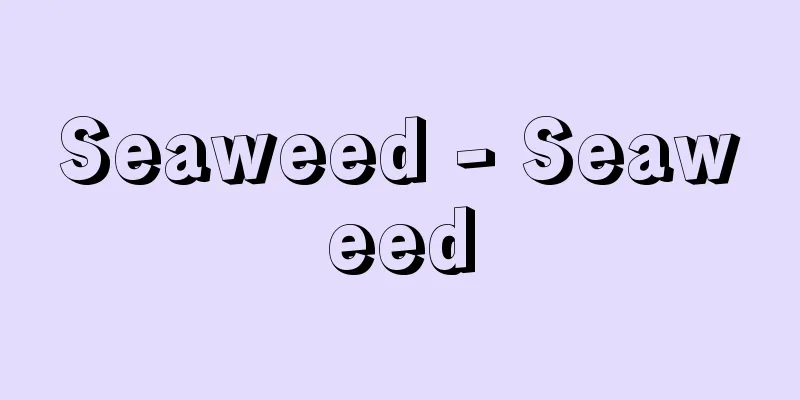Neo-Hegelians

|
This refers to a group of Western philosophers who, from the late 19th century to the early 20th century, were influenced by Dilthey's book The Young Hegel (1905) and Windelband's lecture "The Revival of Hegelianism" (1910), and sought to approach Hegel's theory and spirit. [Kato Naotake] Philosophers who pay attention to HegelAfter Hegel's death, materialism and positivism became more prevalent in the German philosophical world, as seen in the works of Feuerbach and Marx, and Hegel's philosophy was criticized as "idealism." In addition, the Neo-Kantian school, which emerged with its criticism of materialism, criticized Hegel's philosophy as outdated "metaphysics." In response to these criticisms, philosophers who viewed the world as a spiritual entity in some sense and who focused on the spirit as the supreme unifier, began to pay attention to Hegel. In Germany, Ehrenberg, Lasson, Glockner and others were engaged in the editing and publication of Hegel's writings, and the complete works were republished (Glockner) and re-edited (Lasson). Kroner also clearly advocated the position of the "New Hegelian School." In Italy, Gentile ("Thinking is a pure act") and Croce ("Mental activity consists of four areas: art, logic, economics, and ethics") studied Marxism, while also attempting to "reform" Hegelian philosophy from the standpoint of "understanding the world as the activity of the human spirit" while relying on Hegel. In Britain, Green ("Existence is a relation"), Bradley ("Universal propositions are hypothetical propositions"), Bozenquitt ("Truth is the whole, and the understanding of the whole is logic"), and McTaggart ("The substance of reality is the individual mind and its content") made a big impact on traditional empiricism and individualism. [Kato Naotake] Dialectics of the ThinkerThe positioning of Neo-Hegelianism can be seen in Kroner's opening speech at the first Hegel Society (1931), which was planned to mark the 100th anniversary of Hegel's death. He argued that the schools of thought that oppose Hegelian philosophy, such as criticism, phenomenology, and existential philosophy, are in conflict with each other because they are all one-sided and do not realize that they should complement each other to form a whole. He said that the schools of thought that wish to escape from rationalism will be "mediated" and reconciled with each other in Hegel. The "Reform of Hegelian Dialectics" (the title of a work by Gentile) proposed by the Italian Neo-Hegelian School was as follows: All previous philosophies were transcendental in that they presupposed nature as objective in relation to the subject. With Kant, immanentism began, but even Hegel, while aiming for a "dialectic of the thinking," in reality remained at the "dialectic of the thought." Hegelian philosophy must be reformed based on "thinking existence, thought as action." Bradley conceived his own system of speculative metaphysics from a neo-Hegelian standpoint. We strive to realize ourselves as conscious members of an infinite whole by realizing the whole (social community) within ourselves. This is the purpose of morality, and the fulfillment of morality is religion. Religion is also a "phenomenon" that includes contradictions and disharmony, while "reality" is a non-contradictory, unified, and holistic "absolute." Phenomena and reality are mutually related. [Kato Naotake] The impactThe Neo-Hegelian School lost influence with the rise of Nazism. Kroner's attempt to systematize irrationalism reached a dead end when philosophers of the philosophy of life and existentialism sharply exposed the gap between irrationality and system. The reforms attempted by Gentile (who supported Fascism) and Croce (who resisted Fascism) were carried forward in the direction of Marxism, in opposition to their efforts, and Bradley's sophisticated speculations encouraged the emergence of analytical philosophers such as Russell, who criticized them. [Kato Naotake] "From Hegel to Nietzsche" by Levitt, translated by Shibata Jisaburo (1952, Iwanami Shoten) " "Hegel" by Fetcher, translated by Zaoda Yutaka and Kato Naotake (1978, Risosha) [References] | |Source: Shogakukan Encyclopedia Nipponica About Encyclopedia Nipponica Information | Legend |
|
19世紀末から20世紀前半において、ディルタイの著作『若きヘーゲル』(1905)やウィンデルバントの講演「ヘーゲル主義の復興」(1910)の影響を受けて、ヘーゲルの学説とその精神に近づこうとした一群の欧米の哲学者をさす。 [加藤尚武] ヘーゲルに注目する哲学者たちヘーゲル死後、ドイツの哲学界にはフォイエルバハ、マルクス等、唯物論・実証主義の傾向が盛んになり、ヘーゲルの哲学は「観念論だ」と批判された。また、唯物論への批判を携えて登場した新カント学派からも時代遅れの「形而上(けいじじょう)学だ」と批判された。これらに対して、なんらかの意味で世界を精神的存在とみなし、最高統一者としての精神を主題とする哲学者が、ヘーゲルに注目し始めた。 ドイツでは、エーレンベルク、ラッソン、グロックナーらがヘーゲルの文献の編集・刊行に従事し、全集の再刊(グロックナー)・新編集(ラッソン)が行われた。またクローナーは「新ヘーゲル学派」の立場を明確に説いた。イタリアでは、ジェンティーレ(「思考は純粋行為である」)、クローチェ(「精神活動は芸術、論理、経済、倫理の4分野からなる」)がマルクス主義を研究する一方、ヘーゲルに依拠しながら「世界を人間精神の活動としてとらえる」という立場から、ヘーゲル哲学の「改革」を企てた。イギリスでは、グリーン(「実在は関係である」)、ブラッドリー(「普遍命題は仮言命題である」)、ボーズンキット(「真理は全体であり、その全体把握が論理である」)、マクタガード(「現実の本体は個人の心とその内容である」)らが、その伝統的な経験主義・個人主義に対して大きな波紋を投げ与えた。 [加藤尚武] 思惟するものの弁証法新ヘーゲル主義の位置づけは、ヘーゲル死後100年祭に企画された第1回ヘーゲル学会(1931)のクローナーによる開会演説にみてとれる。彼は、ヘーゲル哲学に反対する諸学派、批判主義・現象学・実存哲学が相互に抗争しあうのは、それらがいずれも一面的であって、補足しあって全体となるべきことを自覚しないからである。合理主義からの脱出を望む諸学派は、ヘーゲルのうちに互いに「媒介」され、融和されるであろう、という。 イタリアの新ヘーゲル学派の企てた「ヘーゲル弁証法の改革」(ジェンティーレの著作名)は、次のようなものであった。在来の哲学はいずれも、主観に対して客観としての自然が前提されるという点で超越的であった。カントとともに内在主義が始まるが、ヘーゲルにおいてすら「思惟(しい)するものの弁証法」を目ざしながら、その実は「思惟されたものの弁証法」にとどまっている。「思惟しつつある実在、行動としての思惟」をよりどころに、ヘーゲル哲学を改革しなくてはならない。 ブラッドリーは、新ヘーゲル主義の立場で独自の思弁的形而上学の体系を構想した。われわれは全体者(社会共同体)を自己自身のうちに実現することによって、無限な全体者の自覚的成員として、自己を実現しようとする。これが道徳の目的であり、道徳の完成は宗教である。宗教も、矛盾・不調和を含む「現象」であり、これに対して「実在」が無矛盾的・統一的・全体的「絶対者」である。現象と実在は相互に連関しあっている。 [加藤尚武] その影響新ヘーゲル学派はナチズム台頭とともに影響力を失っていった。クローナーの試みた非合理主義の体系化は、生の哲学や実存主義の哲学者たちが非合理と体系との乖離(かいり)を鋭く暴いたことによって行き詰まった。ジェンティーレ(ファシズムに加担)、クローチェ(ファシズムに抵抗)の企てた改革は、むしろ彼らと反対にマルクス主義の方向へと引き継がれ、ブラッドリーの精緻(せいち)な思弁は、ラッセルら分析哲学者の輩出を促し、彼らによって批判された。 [加藤尚武] 『レヴィット著、柴田治三郎訳『ヘーゲルからニーチェへ』(1952・岩波書店)』▽『フェッチャー著、座小田豊・加藤尚武訳『ヘーゲル』(1978・理想社)』 [参照項目] | |出典 小学館 日本大百科全書(ニッポニカ)日本大百科全書(ニッポニカ)について 情報 | 凡例 |
<<: New edition of Aizu Fudoki
Recommend
milk bush
…(1) Chloranthemum-like shrub with small, early-f...
Futoi (English spelling) soft-stem bulrush
A perennial plant of the Cyperaceae family that gr...
Edo Village Kagura
...It can also refer specifically to shrine maide...
Kirido no Monjudo - Kirido no Monjudo
...The miraculous powers of the principal image o...
Palaeoloxodon meltensis
…Elephant [Kamei Setsuo]. . . *Some of the termin...
Muromachi period art
This article covers art from 1338 (Engen 3/Ryakuo ...
Fenno-Scandia (English spelling)
…It is also written as Scandinavia. If Finland is...
Critical path method
...In fact, in addition to the simple network ana...
Stable nuclides
…When these are classified by atomic number, ther...
Macrophyll - Taiyo (English)
In plant morphology, megaphyll generally refers t...
Calendar time - Rekihyoji
A time system measured based on the revolution of...
Renju (linked beads)
An indoor game in which go stones are placed alter...
Battle of Yorktown - Battle of Yorktown
The battle of Yorktown in 1781 during the American...
amaurotic cat's eye
…It is also called sokohi. Currently, it is not u...
Kennedy, JP (English spelling) KennedyJP
...The family of JF Kennedy, the 35th President o...









